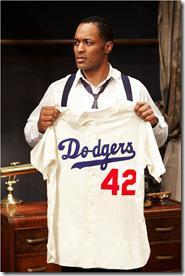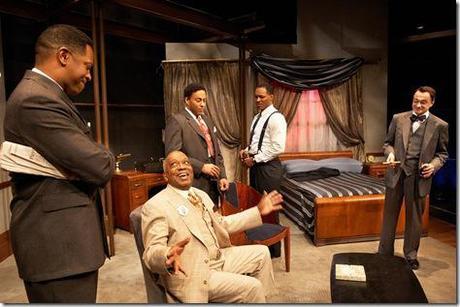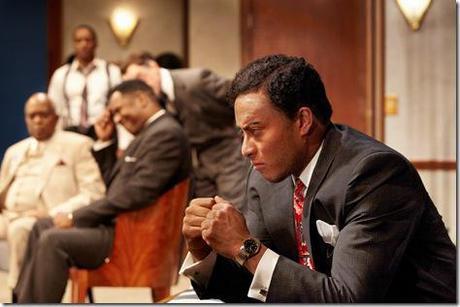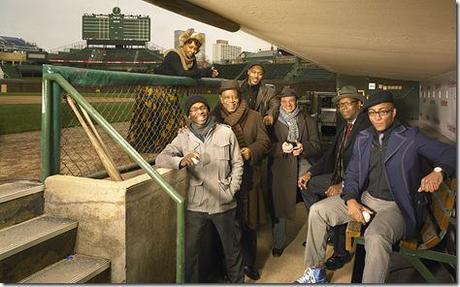
Mr. Rickey Calls a Meeting
Written by Ed Schmidt
Directed by J. Nicole Brooks
Water Tower Water Wks, 821 N. Michigan (map)
thru Feb 19 | tickets: $27-$68 | more info
Check for half-price tickets
Read entire review
A well acted, well-written didactic exercise

Lookingglass Theatre presents
Mr. Rickey Calls a Meeting
Review by Catey Sullivan
Mr. Rickey Calls a Meeting is well acted, well-written and full of both smarts and heart. It also feels more like a rhetorical exercise or an academic debate than a drama intent on entertaining. In its examination of Jackie Robinson’s ground-breaking integration of professional baseball, Ed Schmidt’s talky, 90-minute piece slants toward the didactic rather than dramatic.
Set in 1947 – the year Robinson was called up to the Majors and thus broke out of the box barred by the country’s entrenched, institutional racism – Mr. Rickey plays out in real time, within the often not-so friendly confines of a New York hotel room. The set-up here is both intriguing and marred by a certain degree of artifice. A week before baseball season’s opening day, Brooklyn Dodgers general manager Branch Rickey, so the title handily indicates, calls a meeting. He’s already decided to move Robinson into the big leagues, but Rickey (Larry Neumann Jr.) wants to ease what will surely be a difficult path by presenting a show of unified support from some of the African American community’s most prominent leaders. So in hopes of creating a public relations bonanza, Rickey convenes boxing champ Joe Louis (Anthony Fleming III), revered actor Paul Robeson (James Vincent Meredith) and dancer Bill “Bojangles” Robinson (Ernest Perry) in a hotel room with Robinson himself (Javon Johnson). With a phalanx of sports writers waiting in the lobby, Rickey hopes to present a whopper of a press conference with a show of support from these iconic figures.
Since the meeting never really happened, Schmidt’s dialog comes across with an inherent hypothetical undertone that keeps the audience at arm’s length, despite J. Nicole Brooks insightful, deft direction. None of this is real; it’s all an elaborate game of “what if.” Suspension of disbelief is, of course, a given in any staged endeavor. But in Mr. Rickey Calls a Meeting, that need for that suspension is always front and center as fiction butts up against the realism of a hotel room where the conversation is playing out in real time. The dialog takes on the feeling of a historical thesis rather than a spontaneous conversation . Bojangles, Louis and Robeson were cultural forces to be sure, but they feel randomly assembled. It’s tough to believe that Rickey would feel the future of baseball hinged on the opinions of the country’s pre-eminent tap dancer or Shakespearian actor.

Still, despite the script’s flaws, the Lookingglass production crackles with fine, laser-focused performances. Using few words and indelible presence, Fleming creates a fascinating portrait of Louis as a brooding, angry and immensely intimidating man capable of putting up a daunting fight both in the ring and out. Perry inhabits Bojangles with all the humor and irreverence you’d expect from a veteran vaudevillian (and deftly lands many of the scripts comic zingers.) Meredith brings a heroic nobility to Robeson – and a humanity that’s no small feat given the character’s penchant for speechifying. As for Robinson, Johnson captures the conflict of a gifted athlete who has to make galling compromises in order to get out from under a system that has, for years, thwarted him from achieving his potential and getting his due.
The cost of progress, as the cast so vividly illuminates, is steep. Robinson’s promotion, as Robeson eloquently points out, may well be the beginning of the end of the Negro Baseball League – which would throw thousands of black men out of work. While Rickey argues that progress can only happen one man at a time, Robeson counters that promoting an individual at the expense of countless others is unconscionable. On both sides, the arguments are layered, fraught and provocative. Then there’s the intense scrutiny Robinson will be under, both on and off the field. In exchange for his promotion, he has to agree to keep his mouth shut and just play ball – and endure level of scrutiny that far exceeds what’s given white players. The line between respect and subservience, between being an Uncle Tom and doing what’s needed to integrate the game becomes difficult to pin down as the meeting winds on.
As the general manager who sets the wheels in motion, Neumann shows why he’s one of Chicago’s most valuable character actors. Rickey’s interest is both humanitarian and pragmatic – doing the right thing and helming a ball team that will generate tremendous personal profits for its manager aren’t mutually exclusive. Neumann’s Rickey is as savvy as he is progressive.
Rating: ★★½
Mr. Rickey Calls a Meeting continues through February 19th at Water Tower Water Works, 821 N. Michigan (map), with performances Wednesdays and Fridays at 7:30pm, and Thursdays, Saturdays and Sundays at 3pm and 7:30pm. Tickets are $27-$68, and are available by phone (312-337-0665) or online here (check for half-price tickets at Goldstar.com). More information at LookingglassTheatre.org.

All photos by Sean Williams
artists
cast

